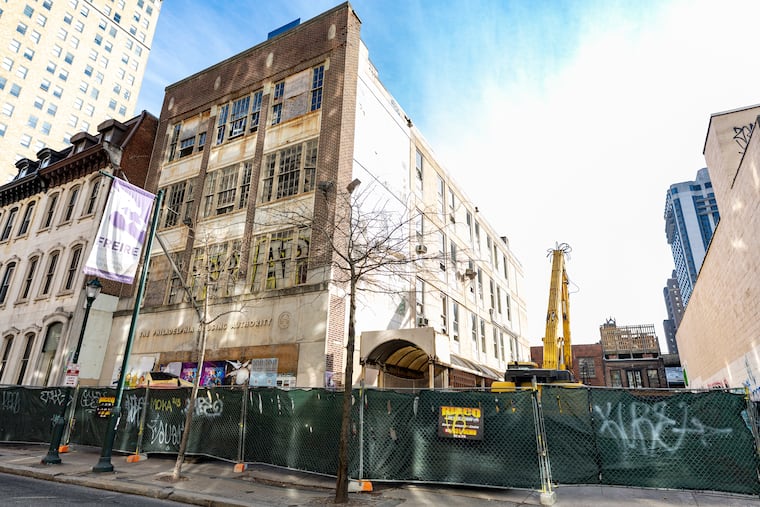Demolition moves ahead for PHA’s former headquarters on Chestnut Street
The Rittenhouse-area office has sat empty for 16 years.

Plans to demolish the former Philadelphia Housing Authority headquarters at 2012 Chestnut St. to make way for a mixed-income 14-story apartment tower are moving forward, potentially bringing new life to a long blighted lot.
The demolition proposal is the first movement on the crumbling property in two years and follows a series of thwarted redevelopment attempts since the housing authority left its four-story office space 16 years ago.
PHA has been working with the Alterra Property Group on the development since 2016, but the latest blueprint for the apartment building will have substantially fewer units, but a greater volume of affordable housing than originally proposed.
The project will now rent 40% of its 121 units at market-rate prices, and 60% to households making below 80% of the area median income — which is about $89,000 annually for a family of four. The original proposal for a 200-unit building had those proportions reversed.
“This gives residents who are on the path to social and economic mobility an opportunity to live and work in Center City and send their children to Center City schools,” said PHA president Kelvin Jeremiah. “Frankly, we don’t have a footprint there, other than this site.”
Under the new plan, the housing authority will also retain control of the property. Originally, Alterra would have received a 99-year ground lease, but now they are just developing the project.
While demolition is scheduled for this spring, the construction timeline is less concrete. Leo Addimando, managing partner of Alterra, said that while he hoped to break ground in a year, financing an affordable housing project of this size could bring unseen delays.
“It’s hard enough to finance market-rate deals right now, then once you throw in affordability it’s incredibly tricky,” he said.
As for PHA, Jeremiah said the agency is using an atypical financing structure. PHA has secured a higher rent subsidy from the U.S. Department of Housing and Urban Development through the Rental Assistance Demonstration (RAD) program. PHA will also issue public activity bonds to raise $45 million for construction costs, which it will repay with rent dollars from the market-rate units.
“We haven’t done one like it, where it’s a combination of private moneys, through the bond financing, and RAD to build in a high opportunity neighborhood,” said Jeremiah.
A long time coming
Since the agency moved out in January 2008, PHA’s low-rise office building has aggravated neighbors.
“It has been, frankly, a bit of an eyesore,” said Jeremiah.
Businesses along the 2000 block of Chestnut Street said the block has low turnover from commercial tenants, and proprietors take pride in keeping the block clean.
Kelsey Ruffing, manager at DFTI, a women’s clothing boutique a few doors down from the building, said there have been break-ins to the empty building and people using drugs or loitering in front of the fence.
The trespassing got so bad that a proactive neighbor put up an extra layer of metal fencing next to the building, she said.
“It’s wasted space,” Ruffing said. “It could be such a good spot for something.”
It was never the agency’s plan for the space to sit empty for 16 years.
After an earlier deal with a private developer fell through, PHA reached an agreement with Alterra in 2016 to build a 200-unit apartment tower at the old site, on the condition that the developer include 40% of the units as below market rate. But the plans stalled amid neighborhood pushback against the project.
“A significant part of this delay had to do with the community, who initially were not particularly supportive of affordable housing,” Jeremiah said.
After years of negotiations, and enabling legislation from City Council, Alterra and PHA were close to moving forward in early 2020.
The pandemic further delayed the project until 2022, when a new architect submitted plans to the Civic Design Review for a significantly smaller, 156-unit complex. But by that point, soaring construction costs and record-high interest rate hikes scrambled the original financing plan. As a result, Jeremiah said, the cost of the project spiked.
“There’s nothing that they, or we, could have done to this point to make this thing come to fruition,” said Addimando, saying the economic maelstrom made the project “impossible to get off the ground” any earlier.